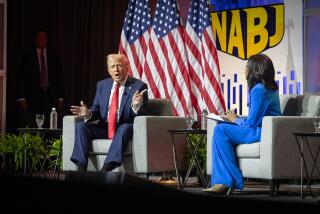Discordant Note Marks Race Initiative
- Share via
HOUSTON — President Clinton tried Tuesday to invigorate his national race initiative by headlining a televised discussion of race and athletics but critics said the event demonstrated one of the fundamental problems afflicting the yearlong effort.
The discussion panel initially assembled by cable television network ESPN to discuss the impact of racial stereotyping and discrimination on professional sports consisted of six blacks and four whites, including Clinton.
It was expanded at the last minute to include a Latino, St. John’s University basketball guard Filepe Lopez but the damage had been done. Latino advocacy groups continued to complain that the panel--and Clinton’s race initiative in general--focused too much on black-white conflicts and not enough on the complicated multiracial issues in America today.
“Race is a hard issue,” acknowledged Judith Winston, executive director of the president’s advisory commission on race, before the 90-minute televised discussion began Tuesday evening. “We knew that starting out. There’s always something.”
Other participants in the 90-minute session were former Cleveland Browns running back Jim Brown, New York Jets wide receiver Keyshawn Johnson, Olympic gold medalist Jackie Joyner-Kersee, Minnesota Vikings coach Dennis Green, Georgetown University basketball coach John Thompson, and ESPN analyst Joe Morgan, all of whom are African American.
The panel’s four white participants were Clinton, San Diego Padres owner John Moores, San Francisco 49ers President Carmen Policy and University of Georgia Athletic Director Vince Dooley.
On Sunday, after a Latino advocacy group wrote to Clinton objecting to the composition of the panel, ESPN announced that it was adding Lopez, a Dominican. The network said that it had tried unsuccessfully to include more Latinos and noted that the audience would reflect their views.
Nonetheless, some Latino groups said the entire incident underscored a broader problem with the race initiative Clinton launched with high hopes and great fanfare last year.
“They always talk about how important it is to be inclusive and to get away from the black-white paradigm,” said Raul Yzaguirre, president of La Raza, a Latino advocacy group.
“But it’s difficult to see a lot of concrete evidence that they’ve gotten away from that paradigm,” Yzaguirre said. “In this event, as with the others, you see the obsession with the past. The black-white issue is a framework of the past and it is totally ignorant of the new framework of the country.”
In Texas and California, Latinos already have become the largest single ethnic minority, Yzaguirre noted, and New York is expected to soon join that list.
Although the ESPN event is only the second “town meeting” on race personally attended by Clinton, his advisory commission has convened a number of similar sessions across the country to talk about racial issues.
At a commission event in Denver last month, Native American activists staged a raucous protest that prevented the session from proceeding as planned. They complained that the president’s advisory board includes no Native Americans and is not adequately addressing issues important to the hundreds of tribes in this country.
“The insult added to the injury that has occurred over numerous years is to be excluded from an initiative that is set up to bridge the race gap,” said Joann Chase, executive director of the National Congress of American Indians, and a member of the Mandan, Hidatsa and Arikara tribes of North Dakota. “As the people who were here first, we gave up so much so that America could flourish. We should at least have a seat at the table when we’re discussing issues of race in America.”
Such conflicts were foreshadowed in the advisory board’s first meeting last year.
Some presidential aides insist that the aggravations and disappointments experienced by the race initiative reflect its relevance.
“People care about this; that’s why they criticize it,” said Paul Begala, a senior Clinton advisor. “In an odd way, I see that as a sign of the success of the initiative itself.”
More to Read
Go beyond the scoreboard
Get the latest on L.A.'s teams in the daily Sports Report newsletter.
You may occasionally receive promotional content from the Los Angeles Times.










